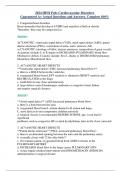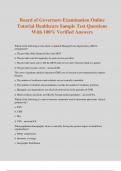Exam (elaborations)
UNIT 5,7and,8 MEETING INDIVIDUAL CARE AND SUPPORT NEEDS Inton, Maria Sophia Ernestine L3 Health and Social Care
- Module
- Institution
TASK 1 SECTION A INTRODUCTION There are many different ways to support individuals in the health and social care settings and how to meet their needs professionally. Some of the key points to meet this mission is to apply care values, promote equality and diversity in the workplace, follow rules...
[Show more]












